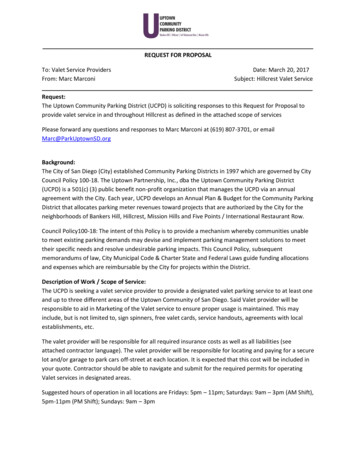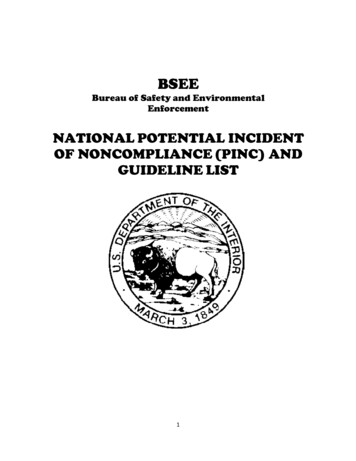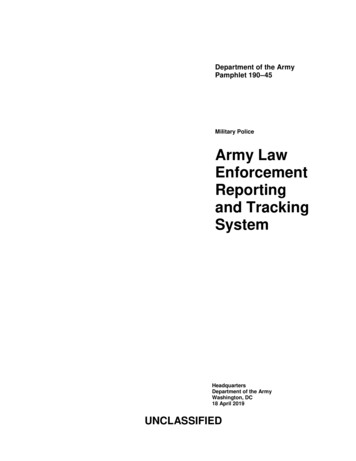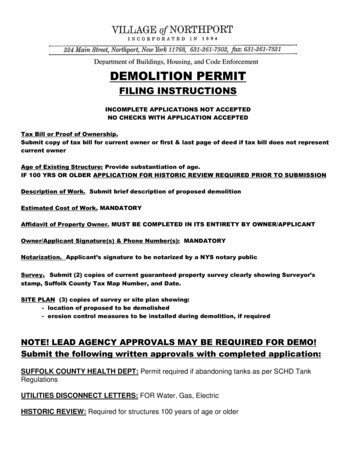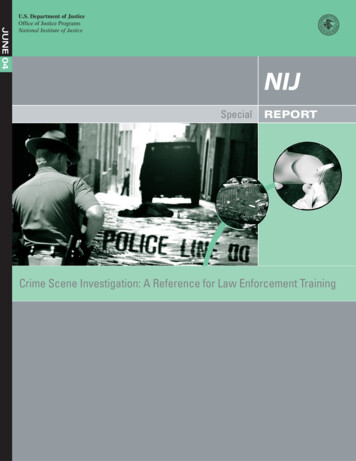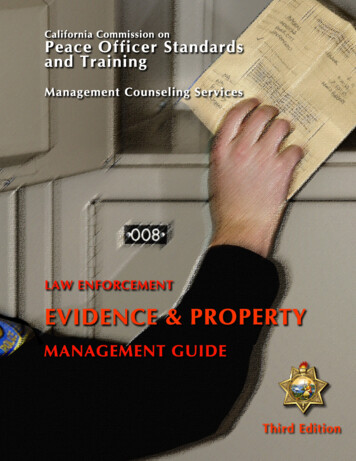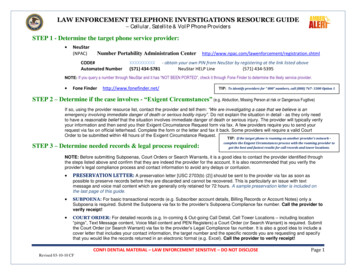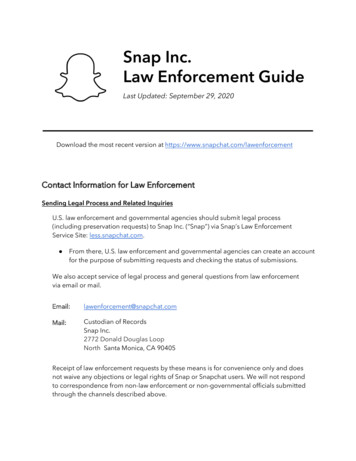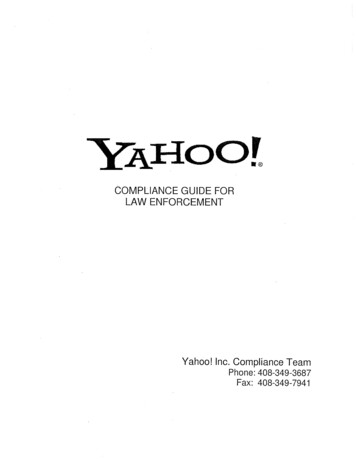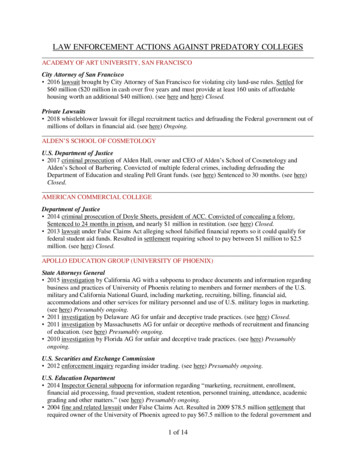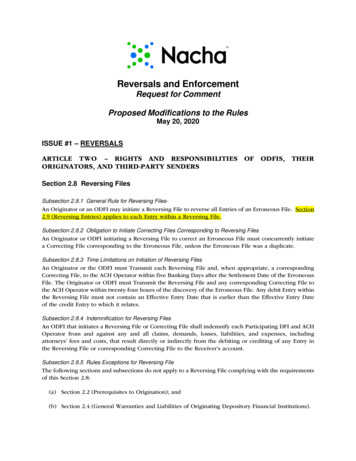
Transcription
Reversals and EnforcementRequest for CommentProposed Modifications to the RulesMay 20, 2020ISSUE #1 – REVERSALSARTICLE TWO – RIGHTS AND RESPONSIBILITIES OF ODFIS, THEIRORIGINATORS, AND THIRD-PARTY SENDERSSection 2.8 Reversing FilesSubsection 2.8.1 General Rule for Reversing Files-An Originator or an ODFI may initiate a Reversing File to reverse all Entries of an Erroneous File. Section2.9 (Reversing Entries) applies to each Entry within a Reversing File.Subsection 2.8.2 Obligation to Initiate Correcting Files Corresponding to Reversing FilesAn Originator or ODFI initiating a Reversing File to correct an Erroneous File must concurrently initiatea Correcting File corresponding to the Erroneous File, unless the Erroneous File was a duplicate.Subsection 2.8.3 Time Limitations on Initiation of Reversing FilesAn Originator or the ODFI must Transmit each Reversing File and, when appropriate, a correspondingCorrecting File, to the ACH Operator within five Banking Days after the Settlement Date of the ErroneousFile. The Originator or ODFI must Transmit the Reversing File and any corresponding Correcting File tothe ACH Operator within twenty-four hours of the discovery of the Erroneous File. Any debit Entry withinthe Reversing File must not contain an Effective Entry Date that is earlier than the Effective Entry Dateof the credit Entry to which it relates.Subsection 2.8.4 Indemnification for Reversing FilesAn ODFI that initiates a Reversing File or Correcting File shall indemnify each Participating DFI and ACHOperator from and against any and all claims, demands, losses, liabilities, and expenses, includingattorneys’ fees and costs, that result directly or indirectly from the debiting or crediting of any Entry inthe Reversing File or corresponding Correcting File to the Receiver’s account.Subsection 2.8.5 Rules Exceptions for Reversing FileThe following sections and subsections do not apply to a Reversing File complying with the requirementsof this Section 2.8:(a) Section 2.2 (Prerequisites to Origination); and(b) Section 2.4 (General Warranties and Liabilities of Originating Depository Financial Institutions).
Request for Comment: Reversals and EnforcementProposed Modifications to the Rules; Page 2May 20, 2020Section 2.9 Reversing EntriesSubsection 2.9.1 General Rule for Reversing EntriesAn Originator or ODFI may initiate a Reversing Entry to correct an Erroneous Entry previously initiatedto a Receiver’s account. The Reversing Entry must be Transmitted to the ACH Operator in such time asto be Transmitted or made available to the RDFI within five Banking Days following the Settlement Dateof the Erroneous Entry.A debit Reversing Entry must not contain an Effective Entry Date that is earlier than the Effective EntryDate of the credit Entry to which it relates.For this Section 2.9 and Subsection 2.12.2 (ODFI Request for Return) only, an Erroneous Entry is definedas an Entry that:(a) is a duplicate of an Entry previously initiated by the Originator or ODFI;(b) orders payment to or from a Receiver different than the Receiver intended to be credited ordebited by the Originator;(c) orders payment in a dollar amount different than was intended by the Originator; or(d) orders payment on a date different than was intended by the Originator; or(d) (e) is a credit PPD Entry satisfying each of the following criteria:(i) the credit PPD Entry is for funds related to a Receiver’s employment;(ii) the value of the credit PPD Entry is fully included in the amount of a Check delivered to thesame Receiver at or prior to the Receiver’s separation from employment; and(iii) the credit PPD Entry was Transmitted by the Originator prior to the delivery of the Check tothe Receiver.The Originator must make a reasonable attempt to notify the Receiver of the Reversing Entry and thereason for the Reversing Entry no later than the Settlement Date of the Reversing Entry. For a credit PPDEntry satisfying the criteria of Subsection 2.9.1(d) above, the Originator must notify the Receiver of theReversing Entry at the time the Check is delivered to the Receiver.Subsection 2.9.2 Formatting Requirements for Reversing EntriesThe Originator or ODFI must submit a Reversing Entry within a batch that includes the word “REVERSAL”in the Company Entry Description field of the Company/Batch Header Record. The description“REVERSAL” must replace the original content of the Company Entry Description field transmitted in theoriginal batch, including content otherwise required by these Rules.For each Reversing Entry, the contents of the following fields must be identical to the original, erroneousEntry to which the Reversal relates:
Request for Comment: Reversals and EnforcementProposed Modifications to the Rules; Page 3May 20, 2020 Standard Entry Class Code;Company Name/Originator Name;Company Identification/Originator Identification; andAmount.The contents of other fields should be modified only as necessary to facilitate proper processing of theReversing Entry.Subsection 2.9.2 2.9.3 Indemnification for Reversing EntriesAn ODFI that initiates a Reversing Entry shall indemnify each RDFI and ACH Operator from and againstany and all claims, demands, losses, liabilities, and expenses, including attorneys’ fees and costs, thatresult directly or indirectly from the debiting or crediting of the Reversing Entry to the Receiver’s account.Subsection 2.9.3 Rules Exceptions for Reversing EntriesThe following subsections do not apply to Reversing Entries complying with the requirements of thisSection 2.9:(a) Section 2.3 (Authorization and Notice of Entries); and(b) Subsection 2.4.1.1 (The Entry Is Authorized by the Originator and Receiver).Subsection 2.9.4 Improper Reversing EntriesSituations that will be treated as improper uses of a Reversing Entry include, but are not limited to:(a) The initiation of a Reversing Entry for any reason other than those explicitly defined in Subsection2.9.1 (General Rule for Reversing Entries);(b) The initiation of a Reversing Entry by an ODFI because its Originator or Third-Party Sendercustomer, or any downstream customer of its Third-Party Sender, failed to provide funding forthe original Entry.(c) The initiation of a Reversing Entry beyond the time period permitted by Subsection 2.9.1 (GeneralRule for Reversing Entries).Improperly-initiated Reversing Entries may be returned by the RDFI.ARTICLE THREE – RIGHTS AND RESPONSIBILITIES OF RDFIS AND THEIRRECEIVERSSection 3.12 Written Statement of Unauthorized DebitAn RDFI must accept a Written Statement of Unauthorized Debit meeting the requirements of Subsection3.12.4 (Form of Written Statement of Unauthorized Debit) from a Receiver with respect to:(a) an unauthorized debit Entry to a Consumer Account of a Receiver; an unauthorized IAT debit toany Receiver’s account; or a debit Entry to a Consumer Account of a Receiver for which the Receiver
Request for Comment: Reversals and EnforcementProposed Modifications to the Rules; Page 4May 20, 2020revoked authorization; as defined in Subsection 3.12.1 (Unauthorized Debit Entry/Authorization for DebitHas Been Revoked);(b) a debit Entry to a Consumer Account of a Receiver, or an ARC, BOC, or POP entry to any Receiver’saccount, that was not initiated in accordance with the terms of the authorization, as defined in Subsection3.12.2 (Debit Entry Not in Accordance with the Terms of the Authorization);(c) an improperly originated RCK Entry, as defined in Subsection 3.12.3 (Improperly Reinitiated RCKEntry).Subsection 3.12.1 Unauthorized Debit Entry/Authorization for Debit Has Been RevokedFor purposes of this Section 3.12, a debit Entry was not authorized by the Receiver if:(a) the authorization requirements of Section 2.3 (Authorization and Notice of Entries) were not met;(b) for ARC and BOC entries, the Receiver’s signature on the source document is not authentic, valid,or authorized;(c) for POP entries, the Receiver’s signature on the written authorization is not authentic, valid, orauthorized; or(d) the Originator obtained an authorization meeting the requirements of Section 2.3, but the Receiverrevoked the authorization directly with the Originator, in accordance with the terms of the authorization,prior to the initiation of the Entry.An unauthorized debit Entry does not include a debit Entry initiated with fraudulent intent by the Receiveror any Person acting in concert with the Receiver.Subsection 3.12.2 Debit Entry Not in Accordance with the Terms of the AuthorizationFor purposes of this Section 3.12, a debit Entry was not “in accordance with the terms of theauthorization” if:(a) the debit Entry was initiated in an amount different than authorized by the Receiver;(b) the debit Entry was initiated for settlement earlier than authorized by the Receiver;(c) the ARC, BOC, or POP Entry was improperly originated, as defined by Subsection 3.12.2.1(Improper ARC, BOC, and POP Debit Entries);(d) the Entry is part of an Incomplete Transaction, as defined by Subsection 3.12.2.2 (IncompleteTransaction); or(e) the Entry was improperly reinitiated, as defined by Subsection 3.12.2.3 (Improperly ReinitiatedDebit Entries).or(f) the Reversing Entry or Reversing File was improperly initiated, as defined by Subsection 3.12.2.4(Improperly-Initiated Reversal).
Request for Comment: Reversals and EnforcementProposed Modifications to the Rules; Page 5May 20, 2020Subsection 3.12.2.1 Improper ARC, BOC, and POP Debit EntriesFor purposes of this Section 3.12, a debit Entry was improper if it was:(a) an ARC, BOC, or POP Entry to any Receiver’s account for which:(i)the source document used for the Entry was not an Eligible Source Document; or(ii) the Check that was used as a source document for the Entry was paid by the RDFI;(b) an ARC or BOC Entry to any Receiver’s account for which:(i) notice was not provided by the Originator in accordance with Subsection 2.5.1.2(Authorization of ARC Entries by Notification) or Subsection 2.5.2.2 (Authorization of BOC Entries byNotification), as applicable; or(ii) the amount of the Entry was not accurately obtained from the Eligible Source Document.Subsection 3.12.2.2 Incomplete TransactionFor purposes of this Section 3.12, a transaction is an Incomplete Transaction if it involves a debit Entryauthorized by a consumer Receiver (or any Receiver with respect to an ARC, BOC, or POP Entry) for thepurpose of funding a corresponding payment to a third-party payee, but the Originator, Third-PartySender, or ODFI of the debit Entry failed to make or complete the corresponding payment to the intendedthird-party payee. An Incomplete Transaction does not include a partial or erroneous payment made tothe intended third-party payee.Subsection 3.12.2.3 Improperly Reinitiated Debit EntriesFor purposes of this Section 3.12, a Reinitiated debit Entry is improper if it is part of any of the followingReinitiation practices:(a) following the Return of an Entry, initiating an Entry to the same Receiver in an amount greaterthan the amount of the previously Returned Entry in payment or fulfillment of the same underlyingobligation plus an additional fee or charge.(b) following the Return of an Entry, initiating one or more Entries to the same Receiver in anamount(s) less than the original Entry in payment or fulfillment of a portion of the same underlyingobligation.(c) reinitiating any Entry that was Returned as unauthorized.(d) initiating any other Entry that the National Association reasonably believes represents anattempted evasion of the limitations on Reinitiation.Subsection 3.12.2.4 Improperly-Initiated ReversalFor purposes of this Section 3.12, a Reversing Entry or Reversing File is improper if it involves any of thefollowing:(a) The initiation of (i) a Reversing Entry for any reason other than those explicitly defined inSubsection 2.9.1 (General Rule for Reversing Entries), or (ii) a Reversing File for any reason otherthan those explicitly defined in Subsection 2.9.1 (General Rule for Reversing Entries) and ArticleEight, Section 8.39 (Erroneous File);
Request for Comment: Reversals and EnforcementProposed Modifications to the Rules; Page 6May 20, 2020(b) The initiation of a Reversing Entry or a Reversing File by an ODFI because its Originator or ThirdParty Sender customer, or any downstream customer of its Third-Party Sender, failed to providefunding for the original Entry to which the Reversal relates.(c) The initiation of a Reversing Entry or a Reversing File beyond the time periods permitted bythese rules.Subsection 3.12.3 Improperly Originated RCK EntryAn improperly originated RCK Entry is one for which:(a) notice stating the terms of the RCK Entry policy was not provided by the Originator in accordancewith Subsection 2.5.13.2 (Authorization of RCK Entries by Notification);(b) the item to which the RCK Entry relates is not an eligible item;(c) all signatures on the item to which the RCK Entry relates are not authorized or authentic;(d) the item to which the RCK Entry relates has been altered;(e) the amount of the RCK Entry was not accurately obtained from the item; or(f)both the RCK Entry and the item to which the RCK Entry relates have been paid.Subsection 3.12.4 Form of Written Statement of Unauthorized DebitThe Written Statement of Unauthorized Debit must be signed or similarly authenticated by the Receiver,submitted within the time frames provided by these Rules, and otherwise conform to the requirementsof this Section 3.12.The Written Statement of Unauthorized Debit must include the following minimum information for eachEntry for which recredit is requested by the Receiver:(a) Receiver’s printed name and signature;(b) Receiver’s account number;(c) identity of the party (i.e., the payee) debiting the account, as provided to the Receiver, and, ifdifferent, the name of the intended third-party payee;(d) date the Entry was posted to the account;(e) dollar amount of Entry;(f)reason for return;(g) signature date;(h) Receiver assertion that the Written Statement of Unauthorized Debit is true and correct; and
Request for Comment: Reversals and EnforcementProposed Modifications to the Rules; Page 7May 20, 2020(i) Receiver assertion that the Receiver is an authorized signer or has corporate authority to act onthe account.The Written Statement of Unauthorized Debit must be dated on or after the Settlement Date of theEntry(ies) for which recredit is requested.More than one unauthorized debit Entry from a single Originator may be documented on a WrittenStatement of Unauthorized Debit, provided that all of the information detailed above is provided for eachdebit Entry for which the Receiver is seeking recredit.Subsection 3.12.5 Retention of Written Statement of Unauthorized DebitAn RDFI must retain the original or a reproducible copy of each Written Statement of Unauthorized Debitfor at least one year from the Settlement Date of the Extended Return Entry(ies) to which the WrittenStatement of Unauthorized Debit relates.Subsection 3.12.6 Copy of Written Statement of Unauthorized DebitAn RDFI Transmitting an Extended Return Entry as provided in Section 3.13 (RDFI Right to TransmitExtended Return Entries) must provide to an ODFI a copy of the Written Statement of Unauthorized Debitobtained from the Receiver in accordance with this Section 3.12 within ten Banking Days after receivinga written request from the ODFI, provided that such request is received by the RDFI within one year ofthe Settlement Date of the Extended Return Entry.ARTICLE EIGHT – DEFINITIONS OF TERMS USED IN THESE RULESSection 8.38 “Erroneous Entry”an Entry that (a) is a duplicate of an Entry previously initiated by the Originator or ODFI; (b) orderspayment to or from a Receiver different than the Receiver intended to be credited or debited by theOriginator; or (c) orders payment in a dollar amount different than was intended by the Originator; or(d) orders payment on a date different than was intended by the Originator.Section 8.39 “Erroneous File”a File that is a duplicate of a previously submitted File, or a File in which each Entry, or each Entry inone or more batches contained in such File, is an Erroneous Entry.APPENDIX THREE – ACH RECORD FORMAT SPECIFICATIONSSubpart 3.2.1 Field Inclusion RequirementsAmount: 10 Positions – Entry Detail Record – Mandatory (ACK, ARC, BOC, CCD, CIE, DNE, ENR, IAT,MTE, POP, POS, PPD, RCK, SHR, TEL, TRC, WEB, XCK, refused ACK, Returns, dishonored Returns,contested dishonored Returns, COR, refused COR); 12 Positions – Entry Detail Record – Mandatory (ADV)The RDFI posts the amount to the appropriate account authorized by the Receiver. A zero Amount isacceptable only with specific Transaction Codes.
Request for Comment: Reversals and EnforcementProposed Modifications to the Rules; Page 8May 20, 2020ADV: The Automated Accounting Advice contains a 12-position field to record the summary debit orcredit amount.ACK, ATX, COR, DNE, ENR: The value of this field is always zero.CCD, CTX: For a zero dollar Entry, the value of this field must be zero.IAT: The value of this field is always reflected in U.S. Dollars.REVERSALS: The amount of a Reversing Entry must be identical to the amount of the original, ErroneousEntry to which the Reversal relates.Company Identification: 10 Positions – Company/Batch Header Record – Mandatory (all batches exceptIAT); 10 Positions – Company/Batch Control Record – Required (all batches)The Company Identification is an alphameric code used to identify an Originator. The CompanyIdentification Field must be included on all Entries.The Company ID may begin with an ANSI one-digit Identification Code Designator (ICD), followed bythe Identification Number. The ANSI Identification Numbers and related ICDs are:IRS Employer Identification Number (EIN) “1.”Data Universal Numbering Systems (DUNS) “3.”User Assigned Number “9.”CIE: This field contains the bill payment service provider’s identification number.IAT: For IAT Entries, the Company Identification Field within the Company/Batch Control Record mustcontain the information found within positions 41-50 (Originator Identification) of the IATCompany/Batch Header Record.MTE (Credits): The ODFI is the company/Originator.WEB (Credits): This field contains the identification code of the Person-to-Person (P2P) service provideridentified in the Company Name field (ODFI or Third-Party Service Provider).REVERSALS: Information contained within the Company Identification field of a Reversing Entry must beidentical to the original, Erroneous Entry to which the Reversal relates.Company Name: 16 Positions – Company/Batch Header Record – Mandatory (all batches except IAT)This field identifies the source of the Entry and is used for descriptive purposes for the Receiver. Exceptas otherwise noted below, this field must contain the name by which the Originator is known to andreadily recognized by the Receiver of the Entry.
Request for Comment: Reversals and EnforcementProposed Modifications to the Rules; Page 9May 20, 2020In a transaction in which the Originator of a debit Entry is not the payee of the transaction (the party towhich payment is ultimately being directed), the Company Name field of the debit Entry must containthe name by which the payee is known to and readily recognized by the Receiver of the Entry. In atransaction in which the Originator of a credit Entry is not the payor of the transaction (the party fromwhich payment is ultimately being directed), the Company Name field of the credit Entry must containthe name by which the payor is known to and readily recognized by the Receiver of the Entry.For Return Fee Entries, this field must contain the same name of the Originator as identified in theCompany Name field of the underlying Entry. For a Return Fee Entry based on the return of a Check, theCompany Name field must contain the name of the payee of the Check.ADV: The ACH Operator is both the Originator and the ODFI. The ACH Operator originating the ADVFile identifies itself by name in this
Correcting File, to the ACH Operator within five Banking Days after the Settlement Date of the Erroneous File. The Originator or ODFI must Transmit the Reversing File and any corresponding Correcting File to the ACH Operator within twenty -four hours of th
